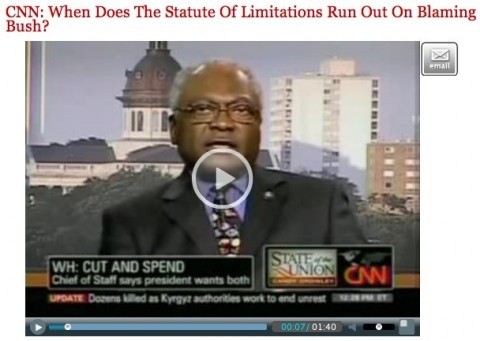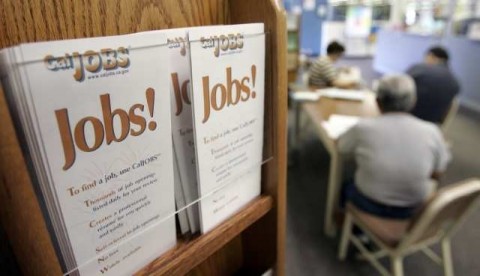Real Clear Politics currently has a video highlighting statements by Democratic Congressman James Clyburn Jr. of South Carolina. It teases the video with a question asked by Candy Crowley of CNN. Once one sees the entire sequence, it’s clear that Clyburn really answered Crowley’s question before she even asked it. Here’s the full transcript of the vid, which begins after Indiana Republican Congressman Mike Pence had apparently made some points about how steps taken by the Obama administration to revive the economy to the point where it generates meaningful job growth aren’t working. Clyburn’s answer to when his party will stop blaming Bush is in bold: Clyburn: Uh, Congressman Spence, uh, Pence keeps talkin’ about, uh, the fact that, uh, we are, uh, failing in our approach. We all know exactly what this president inherited, and we will stop talkin’ about that inheritance, uh, when uh Congressman uh Pence and others stop talkin’ about takin’ us back uh to those failed policies. We’re trying to correct some things that we had absolutely nothin’ to do with, and the American people know that. And I would wish that all of us would get on board this in bipartisan approaches to tryin’ and get our economy stabilized, tryin’ to get our children educated, tryin’ to get workin’ men and women back to, uh, on their jobs, and look for the future, look to the future with — Crowley: Congressman? Clyburn: — a little more, uh compassion and bipartisanship. Crowley: Congressman, I think nobody disagrees with you on the goals. I think that one of the questions that’s cropping up now is, when does the statute of limitations run out on blaming the Bush administration and when is it on you all as the governing — really in the House and the Senate and the White House. When does the economy, uh, become your baby, so to speak? Clyburn: The economy is our baby. But let’s stop talkin’ about cuttin’ taxes, cuttin’ taxes, cuttin’ taxes. That simplistic approach to tryin’ to get this economy movin’ again, it’s what got us in this, uh-uh, position in the first place. We just had an across the board cut on 95% of workin’ men and women, they got an across the board tax cut. You all know that. Pence attempted to get in a word or two edgewise during Clyburn’s final two sentences and got nowhere, though Crowley got to him immediately after that. One can also hear Pence chuckling in the background as Crowley asks here “statute of limitations” question. “Congressman Pence and others” clearly have no plans to “stop talkin’ about takin’ us back to those failed policies” — policies that worked reasonably well from 2003 to 2007 , by the way, despite the sand-in-the-wheels impact of the Sarbanes Oxley law. Therefore, the short version of Clyburn’s answer to the question of when the Bush blame game will stop is, “When you guys shut up.” The one-word version is really, “Never.” As to Clyburn’s contention that “We’re trying to correct some things that we had absolutely nothin’ to do with,” it’s time to remind him and everyone else of the true origins of the housing and mortgage lending bubble. They have everything to do with government-sponsored, mortgage giants Fannie Mae and Freddie Mac, and nothing to do with George Bush, who tried — perhaps not hard enough, but genuinely tried — to stop the madness emanating from those two entities. The full scope of what these Democrat crony-controlled perpetrated on the nation didn’t become fully known until late last year. It wasn’t “only” lax credit standards, which would have been bad enough. Beyond that, as I noted on December 31 (last item at link; a column with a more complete treatment of the topic is here ), there was pervasively fraudulent loan packaging: … it’s hard to overstate the relevance of this paragraph from Peter J. Wallison in the Wall Street Journal , because it should end the debate over who is primarily responsible for the housing and mortgage-lending messes: “There is more to this ugly situation. New research by Edward Pinto, a former chief credit officer for Fannie Mae and a housing expert, has found that from the time Fannie and Freddie began buying risky loans as early as 1993, they routinely misrepresented the mortgages they were acquiring, reporting them as prime when they had characteristics that made them clearly subprime or Alt-A.” The two Democrat-crony government-sponsored enterprises created an artificial market for subprime mortgages by bilking investors for 15 years . If they hadn’t done this, subprimes would never have been able to expand to their mortally dangerous levels. Further, the victims of the misrepresentations logically would appear to include the rating agencies that some state attorneys general are going after as the supposed culprits. Sorry, Mr. Clyburn, your party and its cronies had everything to do with it. The only reason much of the American public doesn’t know this is because reporters like Candy Crowley haven’t educated themselves about what Fan and Fred really did, and therefore won’t challenge your full-of-baloney assertions. Or worse, they know and let it slide. Cross-posted at BizzyBlog.com .

Read the rest here:
Clyburn, Boiled Down: We’ll Never Stop Blaming Bush


























